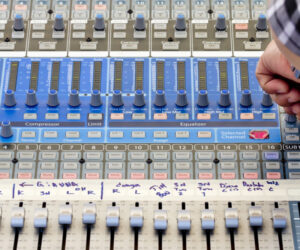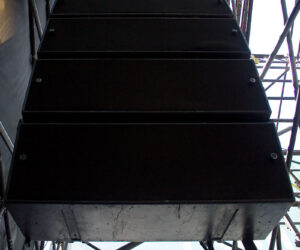
We’re running this Tech Tip Of The Day sans-question because it is so important to your music career and your quality of life that it can’t be ignored.
Plus, there’s no better way to remind you that May is Better Hearing and Speech Month.
So, protect your ears and your hearing!
Whether you are playing live onstage or mixing in your project studio, you face a potentially dangerous situation: excessive volume.
With more and more people spending hours on end recording and mixing down music, this topic has new significance to a new generation of mixers.
Let’s set the stage. Years ago two Bell Labs researchers named Fletcher and Munson determined that our ears do not hear all frequencies with equal sensitivity.
Although we commonly list the range of human hearing as 20Hz to 20kHz, low frequencies require higher SPLs to be heard clearly than mid-to-high frequencies, especially at lower volumes (which is why many home receiver/amplifiers have a “loudness” switch – to boost the bass at lower volume levels).
Most people hear frequencies around 2kHz most clearly, with continued clarity up to 6kHz. To hear all frequencies with a reasonable degree of accuracy, a certain minimum volume level must be maintained.
The Fletcher-Munson curve appears to indicate that our response to different frequencies is at its “flattest” – most consistent – at about 83dB. (Other tests vary to some degree, but it is generally agreed that this is reasonably close.)
Under ideal conditions – perfect source sound, perfect mix, perfect monitors, perfect room – this would suggest that monitoring at 83dB would give you the best possible sonic results. However, real-world project studios and equipment are hardly ideal, and extended listening sessions can worsen the problem.
There’s hardly an audio professional anywhere who hasn’t had to learn, the hard way, what mixing too long will do for a mix. In general you [will] most likely experience what we call ‘ear fatigue.’
Combine that with Temporary Threshold Shift (TTS) from monitoring at louder levels and within a few hours we are often making decisions about things while not receiving (hearing) or processing the information as we normally would.
Since TTS most dramatically reduces our ability to hear high frequencies correctly, we run the risk of mangling lead vocal or solo instrument tracks – arguably the most important and noticeable elements of a modern mix.
Even worse than the detrimental effect on a single mix or project is the risk of long-term hearing loss and tinnitus that prolonged exposure to loud music (or any sound) can bring. Don’t let your excitement about the music you’re making “today” ruin your chances for a life-long career!
Don’t allow your ears to be exposed to loud sounds – especially prolonged ones. Many professional engineers mix in the 70-75dB range and, when they need to check out certain passages or a “final” mix, BRIEFLY turn the volume up to a more “life-like” level.
One pro put it this way: “Mix it like you’re playing it back for your Mom.” A recording truism is that a mix that sounds good at a lower level will usually sound good when turned up.
Even when mixing at lower levels, it’s important to take a break every hour or so to “clear” your ears. Ten or fifteen minutes in a quiet environment can work wonders for your hearing acuity and mixing accuracy.
Even with the breaks, don’t mix too long! You might be following your muse, but if your execution is hampered by ear fatigue, you won’t benefit from your flashes of inspiration.
Wrapping up this Tech Tip Of The Day, we’d like to link to several great organization which provide a wealth of information on hearing loss and protection.
• The American Speech-Language-Hearing Association
• H.E.A.R. (Hearing Education and Awareness for Rockers)
Be sure to visit these organizations for more great information.
For more tech tips go to Sweetwater.com















